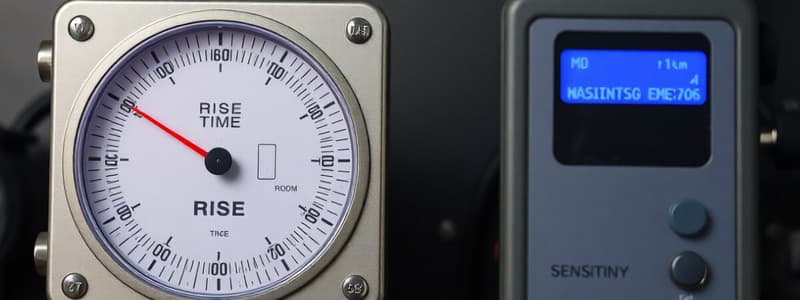Podcast
Questions and Answers
What is the output of a NAND gate when both inputs are at 1?
What is the output of a NAND gate when both inputs are at 1?
- Depends on the supply voltage
- 0 (correct)
- Undefined
- 1
What type of switch can detect the presence of an item without physical contact?
What type of switch can detect the presence of an item without physical contact?
- Resistive switch
- Proximity switch (correct)
- Toggle switch
- Limit switch
What primarily determines the bending of the bimetal strip in a temperature sensor?
What primarily determines the bending of the bimetal strip in a temperature sensor?
- The type of electrical circuit connected
- The temperature difference between the metals
- The coefficients of expansion of the two metals (correct)
- The thickness of the metals used
How does the eddy current type of proximity switch work?
How does the eddy current type of proximity switch work?
Which metals are commonly used in resistive temperature detectors (RTDs)?
Which metals are commonly used in resistive temperature detectors (RTDs)?
What is the primary function of a D flip-flop in the context given?
What is the primary function of a D flip-flop in the context given?
What issue can arise from long leads connecting an RTD to a Wheatstone bridge?
What issue can arise from long leads connecting an RTD to a Wheatstone bridge?
Which of the following switches is actuated by a rotating cam?
Which of the following switches is actuated by a rotating cam?
What is a characteristic of bimetallic temperature sensors?
What is a characteristic of bimetallic temperature sensors?
In the context of NAND gates, what does the 'A' represent in a circuit diagram?
In the context of NAND gates, what does the 'A' represent in a circuit diagram?
What happens in a Wheatstone bridge when the resistors are balanced?
What happens in a Wheatstone bridge when the resistors are balanced?
What triggers the operation of limit switches?
What triggers the operation of limit switches?
What method can improve the accuracy of resistive temperature detectors?
What method can improve the accuracy of resistive temperature detectors?
What occurs when both inputs of a NAND gate are not 1?
What occurs when both inputs of a NAND gate are not 1?
Which attribute is NOT associated with resistive temperature detectors?
Which attribute is NOT associated with resistive temperature detectors?
Why might a bimetal strip not be suitable for highly accurate temperature measurements?
Why might a bimetal strip not be suitable for highly accurate temperature measurements?
What does rise time refer to in a sensor's response?
What does rise time refer to in a sensor's response?
What is the settling time in a measurement system?
What is the settling time in a measurement system?
What does sensitivity describe in a measurement system?
What does sensitivity describe in a measurement system?
What is the term drift usually referring to?
What is the term drift usually referring to?
What is zero drift?
What is zero drift?
How is repeatability defined in a measurement system?
How is repeatability defined in a measurement system?
What common factors can lead to a lack of repeatability in measurements?
What common factors can lead to a lack of repeatability in measurements?
How is the error from repeatability typically expressed?
How is the error from repeatability typically expressed?
What is the main function of the LM35 in the circuit?
What is the main function of the LM35 in the circuit?
What is a key characteristic of the temperature sensors mentioned?
What is a key characteristic of the temperature sensors mentioned?
What is the disadvantage of using the LM35 temperature sensor?
What is the disadvantage of using the LM35 temperature sensor?
What is produced when the hot junction of a thermocouple is heated?
What is produced when the hot junction of a thermocouple is heated?
What is required for the thermocouple voltage before it can be used?
What is required for the thermocouple voltage before it can be used?
Which component is used in the LM3911N circuit for on/off control?
Which component is used in the LM3911N circuit for on/off control?
What happens when the temperature traverses the set point in the LM3911N configuration?
What happens when the temperature traverses the set point in the LM3911N configuration?
What materials are typically used to construct a thermocouple?
What materials are typically used to construct a thermocouple?
What happens to the piston when a current is passed through the solenoid?
What happens to the piston when a current is passed through the solenoid?
What is described by the number of ports and control positions in directional control valves?
What is described by the number of ports and control positions in directional control valves?
In a 4/2 valve, how many control positions does it have?
In a 4/2 valve, how many control positions does it have?
What do the letters P and T indicate in the context of a valve's external connections?
What do the letters P and T indicate in the context of a valve's external connections?
What is the basic symbol used in drawings to represent valves?
What is the basic symbol used in drawings to represent valves?
What does a terminated line within the valve symbol indicate?
What does a terminated line within the valve symbol indicate?
What is the purpose of the piston movement in relation to a conveyor belt?
What is the purpose of the piston movement in relation to a conveyor belt?
What distinguishes a 2/2 valve from a 4/2 valve in terms of flow?
What distinguishes a 2/2 valve from a 4/2 valve in terms of flow?
Flashcards are hidden until you start studying
Study Notes
Rise Time and Settling Time
- Rise time is the time it takes for an output to go from 10% to 90% or 95% of its steady-state value.
- Settling time is the time it takes for the output to settle to a specific percentage, often 2%, of the steady-state value.
Sensitivity
- Sensitivity is the ratio of output change to input change in a measurement system.
- For example, a thermocouple with a sensitivity of 20 mV/°C produces 20 mV for every 1°C temperature change.
Stability and Drift
- Stability refers to the ability of a measurement system to consistently produce the same output for a constant input over time.
- Drift is the change in output over time, usually expressed as a percentage of the full-range output.
- Zero drift is the change in output when there is no input.
Repeatability
- Repeatability is the ability of a measurement system to generate the same value for repeated measurements of the same variable.
- Factors influencing repeatability include random environmental fluctuations like temperature and humidity variations.
- Repeatability error is typically expressed as a percentage of the full-range output.
NAND Gate Circuit Debouncing
- A NAND gate can be used to debounce an SPDT switch by providing an output only when both inputs aren't at logic 1 simultaneously.
D Flip-Flop Debouncing
- A D flip-flop can be used to debounce an SPST switch by introducing a timing element to clear any transient signals.
Limit Switches
- Limit switches, used to detect the presence of objects, can be actuated by a lever, roller, or cam.
Proximity Switches
- Proximity switches detect the presence of objects without physical contact.
- Some types are suitable only for metallic objects.
Eddy Current Proximity Switches
- These switches use a coil energized by alternating current to generate a magnetic field.
- When a metallic object is nearby, eddy currents are induced, allowing the switch to detect its presence.
Bimetallic Temperature Sensors
- Bimetallic elements consist of two different metals with varying coefficients of expansion, bonded together.
- When heated, the strip bends due to the differential expansion, which can actuate electrical contacts.
- This provides a simple on/off temperature control mechanism.
Resistive Temperature Detectors (RTDs)
- RTDs use the temperature-dependent change in electrical resistance of metals like platinum, nickel, or nickel alloys.
- They can be integrated into a Wheatstone bridge circuit, where any resistance imbalance indicates temperature change.
- Three-wire circuits can compensate for lead resistance variations.
LM35 Temperature Sensor
- The LM35 is a temperature sensor that combines a thermotransistor with an operational amplifier.
- It provides a linear output voltage proportional to temperature.
LM3911N Temperature Sensor
- The LM3911N integrates a thermotransistor with an operational amplifier, functioning as a comparator.
- It provides an on/off output based on predefined temperature thresholds, acting as a controller.
Thermocouples
- Thermocouples utilize two dissimilar wires forming a junction.
- A voltage (EMF) is generated when the junction is heated relative to other junctions in the circuit.
- The voltage is proportional to the hot junction temperature.
Solenoid Valves (Directional Control Valves)
- These valves control the flow of hydraulic fluid or pressurized air using a solenoid coil.
- The coil's magnetic field moves a spool valve, directing the fluid to different ports, thus controlling the piston movement.
Numbering System for Directional Control Valves
- Valves are classified by the number of ports and control positions they have.
- For example, a 4/2 valve has four ports and two control positions.
Valve Symbols
- A square represents each control position on valve drawings.
- Arrows within the squares depict flow direction, while a terminated line indicates no flow.
Studying That Suits You
Use AI to generate personalized quizzes and flashcards to suit your learning preferences.




